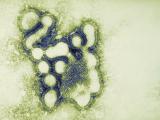Aug 8, 2012 (CIDRAP News) – The count of swine-origin variant H3N2 influenza (H3N2v) cases in Indiana soared to 113 today, a jump of about 100, while Ohio reported a total of 30 cases, double the previous number. But the states said they have not found any person-to-person transmission of the virus.
In a news release, the Indiana State Department of Health (ISDH) said the 113 cases are scattered among 18 counties and predicted that more cases would be confirmed this week. Most of the previous cases have been in children who had contact with pigs at county fairs, but today's announcement gave no details about the patients' age range, swine exposure, or severity of illness.
The Ohio announcement states, "There are currently 30 cases of H3N2v statewide; all individuals had direct contact with swine at fairs and no human-to-human passage of the virus has been confirmed." The counties and their case numbers are Butler, 16; Clark, 3; Gallia, 4; Greene, 4; and Hamilton, 3.
The Ohio patients range from 6 months to 36 years old, the statement said. It said one patient was hospitalized as a precaution but has since been released.
One other H3N2v case was reported recently in Hawaii. With the new Indiana and Ohio cases, the apparent total for the past few weeks has now reached 144.
However, Tom Skinner, a spokesman for the US Centers for Disease Control and Prevention (CDC), cautioned that the growing case count in part reflects increased testing and that some of the cases may not ultimately be confirmed.
"The increase in IN [Indiana] and soon to be other states is because states are now reporting presumptive positive cases based on testing in their labs and part of this is because of increasing numbers of samples arrived for testing compared with last week," Skinner commented via e-mail.
He added that the CDC believes most of the cases are still due to contact with pigs. "However, limited human-to-human transmission with this virus has been observed in the past, and we expect that some human to human spread will be observed in these current outbreaks," he said.
The Indiana release said, "Health officials have not determined person to person transmission at this time, but continue to investigate the possibility."
Skinner and officials from the two states reemphasized the need to take precautions around pigs and when attending fairs. People should wash their hands before and after touching animals and should avoid eating, drinking, or putting anything in the mouth when visiting animal areas, officials said. They also reiterated that the virus is not spread through eating properly prepared pork.
The CDC has said that people who have an increased risk for flu complications, such as the elderly, small children, and those with chronic diseases, should consider avoiding pigs and swine barns this summer.
"It's important for folks to remember this is a mild illness with symptoms similar to what we see with seasonal flu," said State Health Commissioner Gregory Larkin, MD, in the Indiana statement today.
The CDC has developed a candidate vaccine for the new strain, and clinical trials of versions made by two companies are expected this fall.
Indiana counties that have had H3N2v cases, according to today's announcement, are Bartholomew, Greene, Hamilton, Hendricks, Jackson, Jennings, Johnson, Kosciusko, LaPorte, Lawrence, Monroe, Morgan, Owen, Porter, Scott, Tipton, Washington, and White.
A report from Indiana Public Media today said 68 people in Monroe County have contracted the virus. Penny Caudill, administrator of the Monroe County health Department, said the virus does not appear to have spread from person to person, according to the story. The swine barn at the Monroe County Fair was closed last week because of sickness among the pigs.
On Aug 3 the ISDH reported 11 H3N2v cases, and on Aug 6 an ISDH spokesman told CIDRAP News of three more cases, bringing the total to 14 at that point.
The ISDH recently set up a call center to answer questions from the public about H3N2v. The center is open from 8:15 a.m. to 4:45 p.m. weekdays local time, and the phone number is 877-826-0011.
See also:
Aug 8 Indiana press release
Aug 8 Ohio press release
Aug 8 Indiana Public Media story
Aug 6 CIDRAP News story on cases in Indiana and Ohio



















